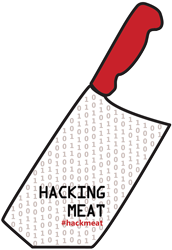 Food+Tech Connect, GRACE Communications Foundation and Applegate are hosting an online conversation, asking leading food and technology innovators: “How can information and technology be used to hack* (or reimagine) the future of meat?”
Food+Tech Connect, GRACE Communications Foundation and Applegate are hosting an online conversation, asking leading food and technology innovators: “How can information and technology be used to hack* (or reimagine) the future of meat?”
There has never been more interest in disrupting the way meat is produced, distributed, sold, consumed and communicated to the public, yet significant barriers exist to scaling current solutions. This is why we are inviting thought leaders and the public to better define these challenges and explore ways that data, technology and new communication methodologies can be used to create a more sustainable, profitable and healthy future of meat.
Please join the conversation and share your own ideas or product requests in the guest post comments, on your own blog (send us a link), on Twitter (hashtag #hackmeat) or on Facebook. We will collect all of your ideas into a community “wish list,”** which will serve as an open resource for those looking to develop or fund meat-related technologies.
While the conversation will begin online, we are also be hosting an in-person “hackathon,” an event during which volunteers will self-organize to develop tools and solve problems over the course of 48 hours. “Meat // Hack” will occur December 7 – 9 in NYC and will bring together key stakeholders to present their meat-related challenges and work with entrepreneurs, technologists, creatives, academics and policy experts to rapidly prototype new solutions. Sign-up to participate in the hackathon here.
Join the #hackmeat conversation:
- Mike Caprio, Brainwave Consulting and Startup Bus : A Software Engineer’s “State of the Meat Union”
- Will Turnage, R/GA, Bread Baking App, & Ratio : How Software Could Re-invent Meat Distribution
- Justin Massa and Ben Stanley, Food Genius : “Meat-ing” Customers Where They Are
- Patty Lovera, Food & Water Watch: Breaking Down Policy
- Arlin Wasserman, Changing Tastes : Choosing a Tasty, Sustainable Future of Meat
- Ulla and Melkorka Kjarval, Sheep Dog Print & Design and Spring Lake Farm : Bringing Economic Sustainability to Family Farms
- Bernard Lahousse, Food Pairing : Algorithms for Less Meat, More Flavor
- Jessica Moore, Philly Cowshare : Animals are Not Widgets
- Helena Bottemiller, Food Safety News: Take the Mystery Out of Meat Labels
- Carl Disalvo and Thomas James Lodato, Georgia Institute of Technology: 6 Meat+Data Icons
- Claire Herminjard, Mindful Meats: How Information Inspired one Consumer to be a Livestock Handler
- Tom Mylan on Better Bacon & Technology
- Mark Wilhelms, Red Meat Market: EAT IT. TWEET IT.
- Jennifer Goggin, FarmersWeb: Buying and Selling Whole Animals
- Chelsea Bardot Lewis, Vermont Agency of Agriculture, and Samuel K. Fuller, Northeast Organic Farming Association of Vermont: Technology in the Niche Meat Value Chain
- Leah Selim, Global Kitchen NY: Meat, Technology and Authentic Ethnic Cooking
- Kara Rota, Cookstr: Cook More, Eat Less Meat
- John Bailey, Top 10 Produce and Dick Stoner, Locale Chesapeake: Mobile Transparency & Marketing From Farm-to-Fork
- Rob O’Donnell, Applegate: An Open Source Farm-to-Table Wish List
- Lorraine Lewandrowski, Honeydale Farm: Why #HackMeat is Perfect For NY
- Isha Datar, New Harvest: We Need Real Labels
- Haven Bourque, HavenBMedia: Why Vegetarians Should Care About Meat Production
- Paul Shapiro, The Humane Society of the United States: Less Meat, and Better Treatment of Farm Animals
- Rob Booz, Chefs Collaborative: How Chefs Can Use Technology to Improve Profitability & Sustainability
*A note on hacking: while many associate the word with a criminal act, “hacking” actually grew out the desire of programmers to explore systems and understand how they could be re-configured or re-programmed to function in new and better ways.
Like the computer software and hardware industries, food and agriculture are highly proprietary industries. And just as the hacking community seeks to understand how a technology works, people are increasingly looking to know who and how their food is produced.
** A huge thank you to Amrit Richmond for inspiring this idea through The Internet Wishlist.


